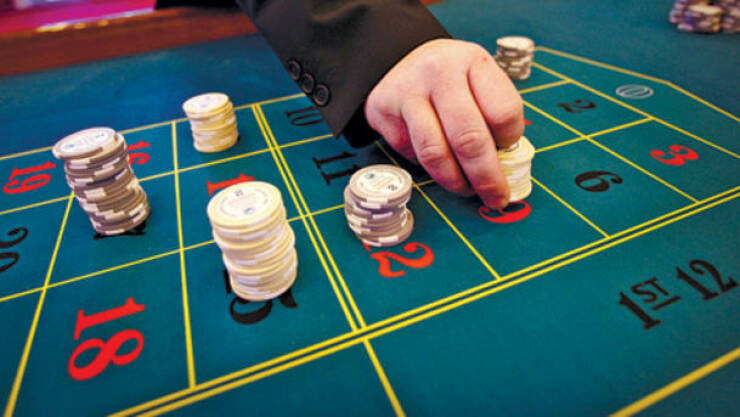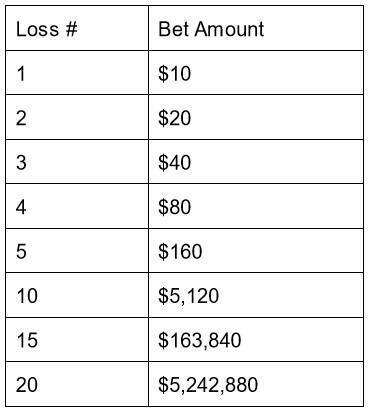1
The concept of martingale betting intrigues many gamblers with its seemingly simple promise: keep doubling your bet after each loss and eventually you'll win back all previous losses plus a profit. This “can’t lose” allure has enticed gamblers for centuries. However the reality behind martingale is far more nuanced and often perilous. When employed on games with roughly 50/50 odds like RetroBet roulette, martingale appears failsafe in theory but carries significant practical risks that rapidly compound.
Martingale Betting System
The core concept of martingale is simple: a gambler bets a set amount, say $10, on an even money wager. If they lose, they bet double the prior amount or $20. If that loses too, they double again to $40 and so forth, until eventually winning. That first win recoups all previous losses plus a small profit equal to the original stake.
For example, consider a roulette player betting $10 on red. The first spin is black; they lose $10. On the next spin they bet $20 on red. Black again so they lose another $20. On the third spin they wager $40 on red. This wins, earning them $40 profit on that spin. That $40 covers the two previous $10 and $20 losses, plus the original $10 stake.
In theory, martingale allows players to remain at the table indefinitely while steadily locking in small profits after each losing streak. Just keep doubling the bet after every loss and a single eventual win will always recoup losses. What could possibly go wrong?
Flawed Math Behind Martingale
While alluring in theory, problems quickly mount when putting martingale into practice. The main mathematical issue is that losing streaks exponentially grow bets to unmanageable amounts. After just five losses in a row, a $10 initial wager becomes $320. After 10 straight losses, the next bet required is a whopping $5,120!
Table: Exponential Bet Growth in Martingale
2
Casinos impose table limits that quickly nullify the martingale system. With a $500 table cap, just seven straight losses in our $10 martingale example bankrupt the player. Even on rare occasions where a player does have millions in their account, casinos protect themselves against unbounded losing streaks by capping maximum bets.
The other mathematical issue is that martingale only works if there is an even money bet available to players. In roulette there are plenty - red/black, odd/even, 1-18/19-36. But if a player tries employing martingale on other common casino games like craps or baccarat where some wagers pay off at less than even money, the system breaks down. Players cannot recoup losses by simply doubling their next bet.
The House Always Wins
Since casinos can impose betting limits well below the astronomical escalation of losses in martingale, they effectively neutralize any chance of the strategy winning over the long run. Assuming a basic $10 initial bet that keeps doubling, table limits will eventually halt the martingale system and the player will be stuck in the red.
Casinos also protect against volatility by building in a mathematical house edge to every game. In roulette the 0 and 00 slots give the house nearly a 5.3% edge. So over time, casinos are virtually guaranteed to earn that percentage of total money wagered. Martingale betting does nothing to overcome that ingrained house edge. The casino still wins even if they lose an occasional high-stakes martingale bet to a lucky player on a hot streak. They know that short term luck always reverts to the house’s edge over hundreds, thousands or millions of spins.
Why Martingale Tempts Gamblers
Understanding the mathematical flaws underlying martingale, why does it still so frequently tempt gamblers into trying to beat the house? For one, it seems so obvious and easy to understand at first glance. Just double the next bet until you finally win. Beginners can grasp that concept intuitively without needing an advanced statistics degree.
Another reason is that martingale truly does work in the short run. Gamblers may experience brief success doubling down after losses and manage to book small wins here and there. However once a losing streak hits, the losses pile up catastrophically. Even veteran gamblers think they can keep doubling down indefinitely, but lengthy losing streaks are an inevitable certainty in random games like roulette. Once they occur, even deep pocketed players face eventual financial ruin.
So while martingale appears to be an alluring “can’t lose” system at first, its inherent flaws ensure the house always wins over the long haul. Savvy gamblers understand why this betting strategy ultimately fails and focus instead on enjoying casinos responsibly for entertainment rather than hinging their bankroll on a flawed system.



